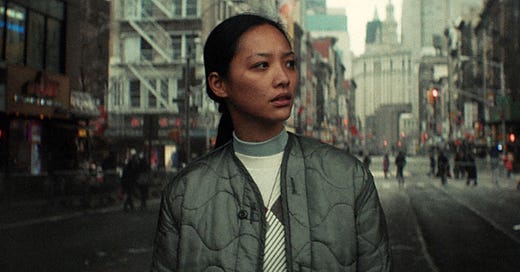Snakehead
Documentarian Evan Jackson Leong makes the leap to narrative features and takes Han from "The Fast and the Furious" franchise along for the ride with "Snakehead."
This review is free content for everyone. Please support Film Yap with a subscription to receive all our premium articles and exclusive opportunities — now at a huge discount!
I mostly agreed to review writer/director Evan Jackson Leong’s Asian crime saga “Snakehead” (available in select theaters and on VOD beginning Friday, Oct. 29) because it co-stars Sung Kang.
I’m a big ol’ fan of Kang’s. The first time I saw the dude was in Justin Lin’s “Better Luck Tomorrow” where he came across like an Asian-American James Dean. (Seriously, I’d be perfectly content just watching this cat smoke cigarettes for an hour and a half.) Kang’s Han (a continuation of his “BLT” role) is easily my favorite character in “The Fast and the Furious” franchise. Hell, I even dug Walter Hill’s much-maligned “Bullet to the Head,” which cast Kang as a cop opposite Sylvester Stallone’s hitman. (If you haven’t seen “BttH,” I’d highly recommend doing so. It concludes with an axe fight between Stallone and Jason Momoa … baller!)
I’m glad my Kang fandom drew me toward “Snakehead” as the movie is quite good and shines a light on many important issues.
Shuya Chang (“Crouching Tiger, Hidden Dragon: Sword of Destiny”) stars as Sister Tse, a Chinese ex-convict/immigrant who has a titular snakehead smuggle her into New York City’s Chinatown. Tse hopes that she’ll be able to reunite with her daughter Rosie (Catherine Jiang) who was taken from her when she was incarcerated and subsequently adopted by an American family.
Getting smuggled into the United States ain’t cheap and Tse is on the hook for $50,000 to a Triad family fronted by Dai Mah (Jade Wu, “Luke Cage”). Tse is so unwilling to be prostituted that she beats the breaks off of gang enforcer Suhyun (Perry Yung, best known for Cinemax’s “The Knick” and “Warrior”), which impresses Dai Mah.
At first Tse works alongside Zareeb (Yacine Djoumbaye) in Dai Mah’s dumpling shop, but she quickly climbs the criminal ranks by making collections and eventually engaging in human trafficking. Dai Mah’s hot-headed son Rambo (Kang – sort of a funny name for the actor’s character due to his history with Stallone) grows jealous and suspicious of Tse’s ascension, which will ultimately threaten her reunion with Rosie.
Kang is good in the movie – his Rambo is every bit as despicable as Han is digable – but he’s outshone at every turn by his two formidable leading ladies. Chang plays both Tse’s determination and humanity beautifully and the character is never less than sympathetic despite committing atrocious actions. Wu gives the film’s best performance as Dai Mai easily oscillating between a mother’s warmth and a killer’s cold heart on the turn of a dime.
Documentarian Leong (best known for the Justin Lin basketball doc “Linsanity”) makes his narrative feature debut with “Snakehead” … and it’s an impressive one. The cinematography by Ray Huang is certainly evocative of this particular time and place. Chinatown’s cityscapes are both beautiful and foreboding here. The picture is a gritty one and doesn’t pull its punches in depicting the horrors of human trafficking. If Leong and “Snakehead” have a downfall it’s in the overreliance on clumsily written voiceover. I suspect Leong will show more than tell next time out and I for one am curious to see it.





